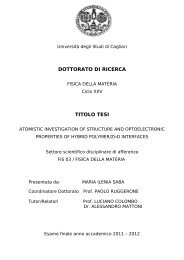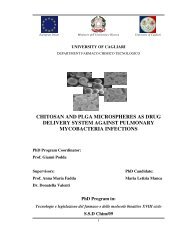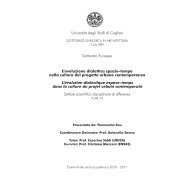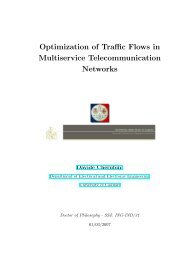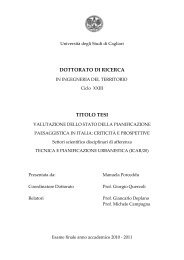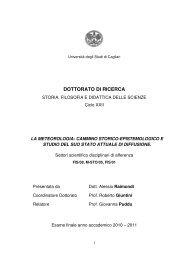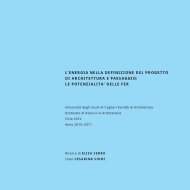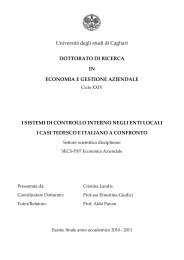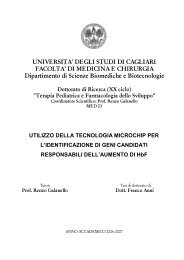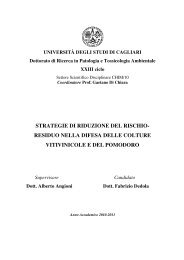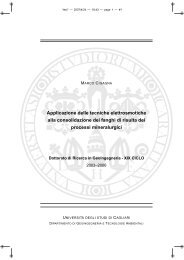The only truly alien planet is Earth. - UniCA Eprints - Università degli ...
The only truly alien planet is Earth. - UniCA Eprints - Università degli ...
The only truly alien planet is Earth. - UniCA Eprints - Università degli ...
You also want an ePaper? Increase the reach of your titles
YUMPU automatically turns print PDFs into web optimized ePapers that Google loves.
In un’interv<strong>is</strong>ta del 1990 David Pringle chiede a Ballard se si considera un autore di<br />
narrativa ‘horror’. Ci si potrebbe aspettare che la r<strong>is</strong>posta sia un semplice no, invece lo scrittore si<br />
esprime in maniera più articolata, facendo riferimento a Crash nell’esprimere il suo punto di v<strong>is</strong>ta<br />
sul genere, dalle origini ai nostri giorni:<br />
You could say Crash <strong>is</strong> on the edges of horror fiction. I take it that, in horror fiction, the horrific<br />
effects are the object of the exerc<strong>is</strong>e. In the Gothic novel the clanking chains and creaking drawbridges and<br />
wh<strong>is</strong>tling pendulums are the object; the chill of terror and fear <strong>is</strong> the whole purpose. Whereas in a book like<br />
Crash I'm not out to make the blood run cold: I'm trying to look at the erotic<strong>is</strong>m of the car crash and the way<br />
modern technology has infiltrated our minds, taken over a large part of our imaginations and created a world<br />
of very different values. I've never thought of myself as a writer of horror. When you're dealing with a<br />
sensational subject matter, where you're showing radical changes with people making sudden d<strong>is</strong>coveries<br />
about the reality of their lives in dramatic circumstances, where people are being plagued by intense mental<br />
cr<strong>is</strong>es (as they are in a lot of my fiction), you're getting into an area close to horror fiction. <strong>The</strong> main props of<br />
the classic tale of terror were haunted castles and alike. <strong>The</strong> present day equivalents of haunted castles are<br />
psychiatric hospitals; the blade-tipped pendulum has given way to the scalpel in the neurosurgeon's fingers.<br />
It's not the evil potion in a dusty bell-jar that frightens us now, it's the contents of the hypodermic syringe,<br />
and the needle that may not be too clean. <strong>The</strong> props have changed. <strong>The</strong>re are sudden glimpses of the<br />
shocking and unspeakable in my fiction too, so there <strong>is</strong> a certain overlap 366 .<br />
Queste parole confermano il legame di Ballard con alcuni aspetti del romantic<strong>is</strong>mo, ancora<br />
presenti anche nel gotico contemporaneo, e tra questi in particolare la fascinazione per gli oscuri<br />
ab<strong>is</strong>si dell’inconscio 367 .<br />
were really training the good doctors to lose all interest in sex, just as computer<strong>is</strong>ed diagnostic machines, where patients<br />
press buttons in reply to stock questions, are inadvertently training them to develop duodenal ulcers or varicose veins.»<br />
J. G. Ballard, Atrocity, a cura di V. Vale e A. Juno, op. cit., p. 19.<br />
366 D. Pringle, Fear n. 14, febbraio 1990.<br />
367 «Unencumbered by the conventions and restrictions of real<strong>is</strong>m, the prose romance cultivates the power of the<br />
imagination in its most heightened mode, while, correspondingly, its concerns are not the commonplace themes of the<br />
familiar world, but the terrors and wonders of the human mind. In its chief manifestation as the Gothic novel, during the<br />
period of the late eighteenth and early nineteenth centuries, the prose romance reintroduced to literature the dark realm<br />
of the irrational, the world of the unconscious, traditionally neglected or slighted by the novel proper.» G. Stephenson,<br />
op. cit., pp. 160-161.<br />
- 112 -



